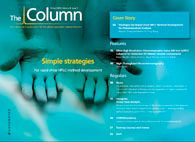Organic separation
A team of scientists have performed the first attempt at separation of organic compounds using microwave reversed-phase high performance liquid chromatography (MW?HPLC).
A team of scientists have performed the first attempt at separation of organic compounds using microwave reversed-phase high performance liquid chromatography (MW–HPLC).1
Biotin and riboflavin were the organic compounds that were trialled and additional vitamins were used for reference purposes. A column was placed inside a domestic microwave oven in a hanging position. The position of the column in the microwave was of vital importance, as it precluded the actual power absorbed by the sample.
Vitamins were detected using a UV-vis detector and the results revealed that the application of microwave radiation significantly modified the characteristics of the chromatograms. Retention times for both biotin and riboflavin were both shortened as the power increased. The peak shape also changed, more significantly for biotin than riboflavin.
The team concluded that MW–HPLC was more efficient at compound separation than when the same experiment was performed at room temperature or thermostatted at 45 °C HPLC. It was believed that this was due to the combined action of a moderate and quick heating of the mobile phase that increased the analytes diffusivity caused by the radiation
1. José Todolí et al., Analyst, DOI: 10.1039/C2AN16193A (2012).
This story originally appeared in The Column. Click here to view that issue.
HPLC 2025 Preview: Fundamentally Speaking (Part 1)
May 13th 2025Michael Lämmerhofer from the Institute of Pharmaceutical Sciences, University of Tübingen, Germany, spoke to JFK Huber Lecture Award winner of 2024 Torgny Fornstedt, professor in analytical chemistry and leader of the Fundamental Separation Science Group, Karlstad University, Sweden, about his pioneering work in high performance liquid chromatography (HPLC) with a focus on fundamentals and industrial applications.
Reversed-Phases for LC Deliberately Doped with Positive Charge: Tips and Tricks for Effective Use
May 13th 2025In this month's edition of LC Troubleshooting, Dwight Stoll and his fellow researchers discuss both the benefits (improved peak shape/loading) and challenges (excessive interaction) associated with charge-doped reversed-phase (RP) columns for both analytical and preparative separations.
Determining Ways to Protect Honeybee Colonies with GC–MS
May 13th 2025A study conducted by the Agriculture Research Centre of Giza, Egypt, and Jilin Agricultural University in China, evaluated the efficacy of stinging nettle extract, nettle smoke, and formic acid in the controlling of Varroa mites, a major threat to honeybee colonies, with a focus on mite infestation reduction, honeybee mortality, and biochemical responses. Gas chromatography–mass spectrometry (GC–MS) was used to identify key bioactive compounds in the stinging nettle extract.

.png&w=3840&q=75)

.png&w=3840&q=75)



.png&w=3840&q=75)



.png&w=3840&q=75)










